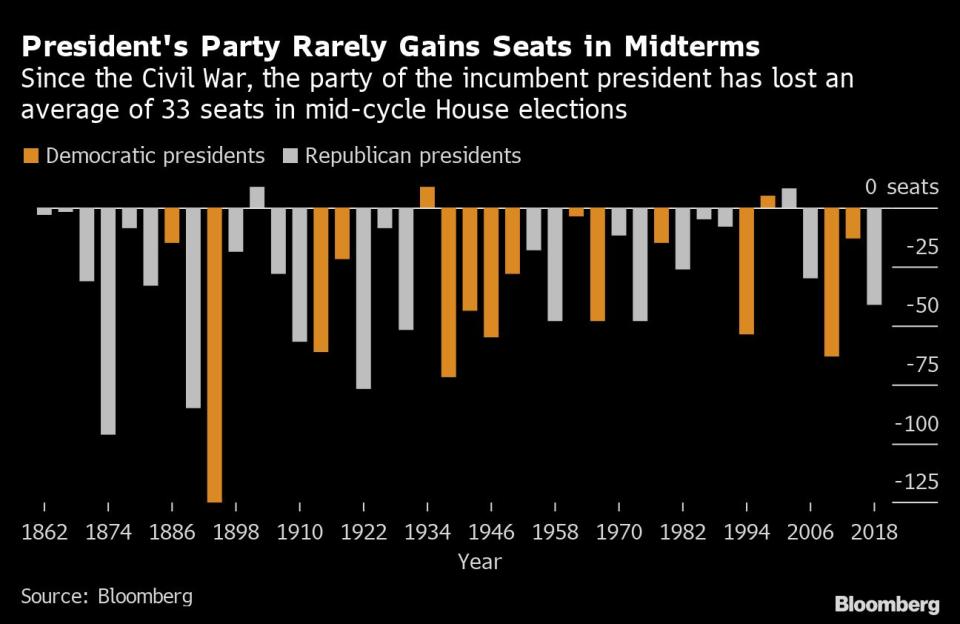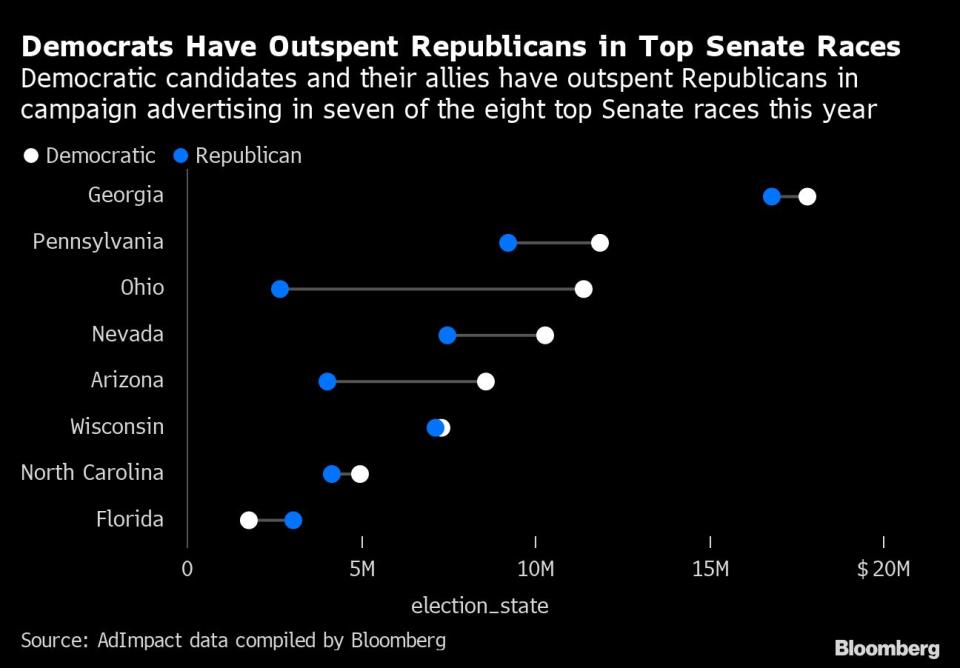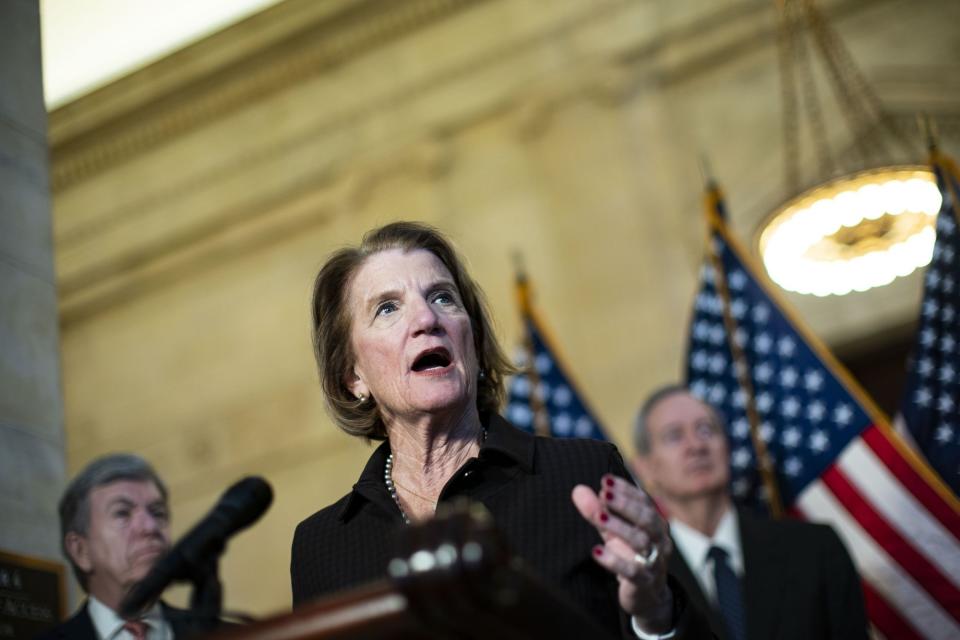GOP Is on the Defense as Chances of a ‘Red Wave’ Fade
(Bloomberg) -- Republican leaders are scrambling to salvage the party’s chances at a congressional majority and stave off an embarrassing midterm election performance in a year that the GOP was heavily favored to take control of both chambers.
Most Read from Bloomberg
Double Rainbow Appears Over Buckingham Palace as Crowd Gathers to Mourn Queen
Queen Elizabeth II, Britain’s Longest-Reigning Monarch, Dies at 96
Two top Republican senators have feuded over strategy amid a shortfall in fundraising and concerns about candidate recruitment. The party is playing defense in states where it currently holds Senate seats -- North Carolina, Ohio, Pennsylvania and Wisconsin -- and is behind or in tight races for once-promising pickup opportunities in Democratic-held states like Georgia, Nevada and New Hampshire.
“We have a great opportunity here, so I don’t think it’s good strategy to be feuding two months before the election,” Senator Shelley Moore Capito of West Virginia told reporters Tuesday.
Republicans in the House are set to unveil a united party platform -- similar to the “Contract with America” used by then-Republican leader Newt Gingrich to win the House in 1994 -- to give them an added boost as Democratic enthusiasm has rebounded.
With nine weeks before Election Day, Republicans find themselves in a much different position than just a few months ago, when a so-called “red wave” of Republican victories seemed inevitable.
President Joe Biden’s approval was under 40% and inflation -- led by food and gasoline prices -- was mounting. Those are conditions nearly guaranteed to help the party out of power, which has gained an average of 37 seats in similar conditions in the past.
With narrow Democratic majorities in both chambers -- a five-vote advantage in the House and a 50-50 Senate controlled by the tie-breaking vote of Vice President Kamala Harris -- odds-makers still favor Republicans to win enough votes to halt Biden’s agenda for the next two years.
The risk now is that Republicans will squander a year that looked to be on par with the 63-seat “shellacking” former President Barack Obama took in his first midterm election presiding over a Democratic Congress.
The non-partisan Cook Political Report is projecting a net GOP gain of between 10 and 20 House seats, down from as many as 35 seats before the Supreme Court ruling in June that overturned the decision that legalized abortion and prices for gasoline and goods were higher.
But with expectations high, a Republican underperformance threatens to squelch any momentum the party was banking on to retake the White House in 2024.
Senate Struggles
One distraction is an open feud between the two Republicans most actively working to secure a GOP Senate this fall: Florida Senator Rick Scott, who chairs the campaign arm known as the National Republican Senatorial Committee, and Minority Leader Mitch McConnell of Kentucky, with his own super-PAC known as the Senate Leadership Fund.
McConnell has warned about the risk of untested and unelectable candidates losing winnable seats, having been burned by what he calls “candidate quality” issues for lost races a decade ago.
Scott in turn penned an op-ed calling unnamed Republicans trash-talking the party’s slate “treasonous to the conservative cause.” Scott told reporters that he wasn’t talking about McConnell, but told Politico last week that he and the leader have a “strategic disagreement.”
On Wednesday, Scott defended his management of the Republicans’ Senate campaign on Fox News, saying the NRSC burned through all but $23 million of its war chest in order to define Democrats as extremists early in the cycle. “We did the right thing. We spent early,” he said. “Here’s the thing with campaigns, if you wait until the last month, I mean, there’s too much static, too much noise out there.”
He predicted that the GOP could pick up as many as six Senate seats.
But the rift exposes a deeper problem for the GOP: Fundraising.
In the eight battlegrounds that will decide the majority, Democratic candidates have raised a total of $190 million more than Republicans. Only Senator Ron Johnson of Wisconsin enjoys a financial advantage over his opponent, Mandela Barnes, the state’s lieutenant governor, though he trails anywhere from 2 to 7 percentage points in recent polls.
Party money would normally close some of that gap. But the NRSC, which netted $171 million thanks to an expensive fundraising strategy emphasizing small-dollar donors, ended July with only $23 million in the bank. That was less than half of the $54 million its Democratic counterpart held.
“It concerns me a lot that Democrats are going to massively outspend Republicans across the board,” Senator John Cornyn of Texas, a former head of the National Republican Senatorial Committee, told reporters at the Capitol. “But as long as we have enough money to tell our story and to defend our position, I think we’ll be fine.”
Party of Trump
The divisions extend to policy as well. Earlier this year, Scott released his own, politically explosive agenda calling for an expiration date to all federal laws after five years and requiring all Americans to pay at least some income tax.
“We will not have as a part of our agenda a bill that raises taxes on half the American people and sunsets Social Security and Medicare within five years,” McConnell told reporters then.
The infighting reflects a recognition of the more difficult political environment the GOP faces today compared with earlier in the year, but also of the frustration that Democrats have the fundraising advantage -- and spending is one way Republicans can make up the polling gap in races, Republican strategist John Thomas said.
“It should be a massive concern, particularly on the spending disparity,” Thomas said. “Something’s gotta break, either it’s an issue set that animates Republican voters to dramatically shift polling, or it’s got to be a spending advantage. And right now we don’t have either of those.”
Also hanging over the campaign is the long shadow of former President Donald Trump, whose primary election endorsements helped nominate a number of candidates short on political experience but long on personal loyalty. Those candidates include venture capitalists Blake Masters in Arizona and J.D. Vance in Ohio, football star Herschel Walker in Georgia and celebrity physician Mehmet Oz in Pennsylvania.
Many of Trump’s endorsed candidates also espouse his false stolen election claims. And Trump has been critical of McConnell after the Senate leader forcefully opposed Trump’s efforts to overturn the election on Jan. 6, 2021 and blamed the former president for provoking the riot at the US Capitol.
Asked Wednesday about funding shortfalls at the NRSC, McConnell pitched unity without mentioning Scott, who was standing behind him.
“What I think I can safely say is all 50 members of the Senate on my side of the aisle are doing everything they can to help find a way to get to 51,” he said. “Once we finish up work here this month, we’ll all be in full campaign mode.”
House Strategy
On the House side, Republican Leader Kevin McCarthy is set to unveil the party’s legislative platform this month -- a project more than 14 months in the making and coming just weeks before the election.
“Republicans have a plan for a new direction that will get our country back on track. Our plan is a Commitment to America,” McCarthy said.
Representative Guy Reschenthaler, who worked on China policy for the new platform -- said the rollout, scheduled to take place Sept. 19 in Monongahela, outside Pittsburgh, will energize and unify all parts of the Republican conference.
“This commitment with America is aimed at working class, every-day Americans,” said Reschenthaler, who represents parts of western Pennsylvania, a region that has been seeing GOP registration and enrollment gains.
(Adds Scott comment in 14th paragraph.)
Most Read from Bloomberg Businessweek
What a Rocket Startup That Helped Create the ‘New Space’ Wave Leaves Behind
How a Sparkling Water Company Built a Brand on Bruised Fruit
©2022 Bloomberg L.P.






